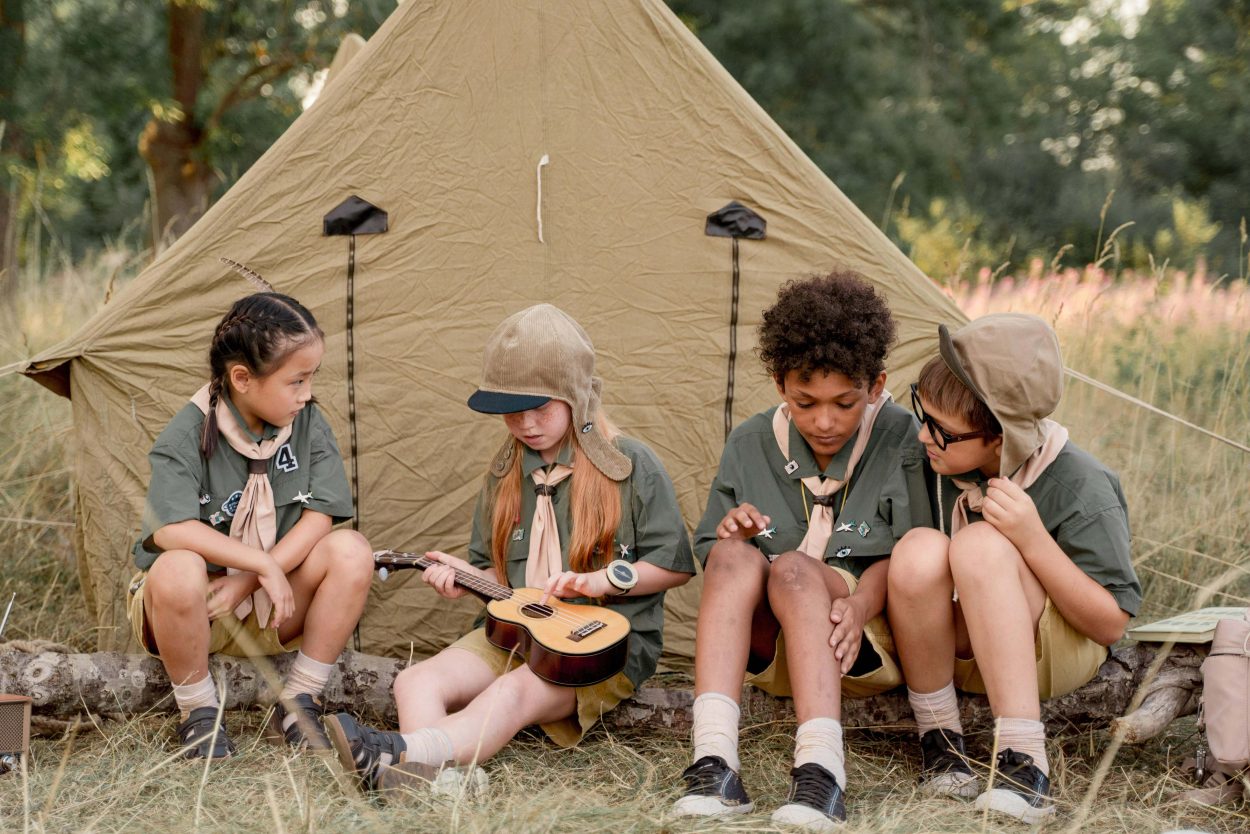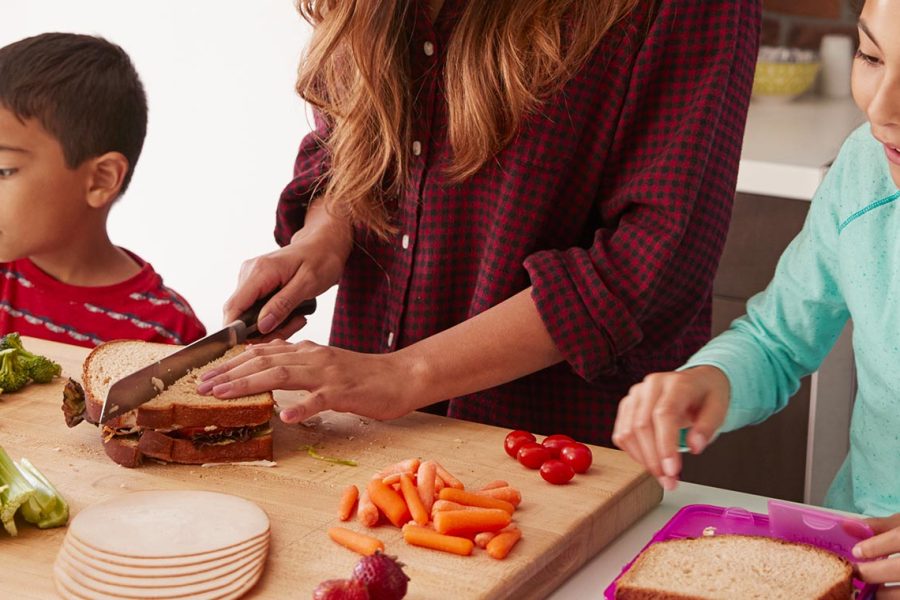Summer is around the corner, and for many kids, that means camp time! Whether it’s their first experience or they’re seasoned campers, a little preparation can make all the difference. From easing first-day nerves to packing the essentials, getting ready for camp goes beyond just filling a duffle bag—it’s about building excitement and confidence. Here’s how to help your child feel ready for an unforgettable summer adventure!
Choose the best camp
The “right” camp isn’t the same for every child! What works for one may be different for a friend or even a sibling.
Some children are more independent and will enjoy overnight camps, while others may feel more secure in camps that take place during typical school-day hours.
Some will prefer traditional camps, which offer a variety of activities and allow them to explore different interests, while others may opt for specialized programs focused on a specific sport or hobby.
The most important thing is to choose a camp where your child will feel comfortable and thrive!
Types of Summer Camps: Day vs. Overnight Options
Day camps typically run during the daytime, allowing children to participate in structured programs while returning home each evening. They are often located close to home, in a school, community center, or local sports facility. They are an excellent option for younger children or those who are not yet ready to spend an extended period away from home. Plus, they allow families to maintain a familiar daily routine, even though camp days differ from school!
- Duration: Daily activity programs usually run for five consecutive days, although some camps also offer single-day options.
- Types of Activities: Day camps typically include cooperative games, sports, field trips, themed activities, arts and crafts, and more. Some also specialize in one or more disciplines, such as dance or science. With so many options available, each week at day camp becomes an opportunity to try new activities and discover new passions!
On the other hand, overnight camps provide a more immersive experience, where children stay for multiple nights, fostering independence and helping them form stronger friendships. This type of camp requires a bit more preparation, as there are lists of items to consider.
- Duration: Depending on the camp, stays can range from two nights to a full month, with one-week and two-week stays being the most common.
- Types of Activities: they offer a variety of outdoor activities, such as canoeing, swimming, obstacle courses, and campfires, just to name a few. Some also specialize in specific disciplines, like horseback riding, circus arts, and more.
You can find the best camps in Quebec on the Association des camps du Québec website!
Ensuring Healt and Safety at Camp
Health and safety at camp are vital priorities to ensure the well-being of all kids. Some camps require documentation regarding children’s health to provide a safe environment. For example, they will need to check that vaccinations are up to date, so it is important to provide your child’s current medical records before camp begins.
Additionally, if your child has special needs, further documentation may be required, such as action plans for asthma, allergies requiring EpiPens, or Individualized Education Programs (IEPs). If your child has asthma or a severe allergy, be sure to include their asthma puffer and EpiPen in their camp belongings. If your child is taking prescription medication, you should send an appropriate supply in the original container with the instructions clearly listed on the label. Make sure these medications are easily accessible so that camp staff can respond quickly if needed.
You should be in close communication with camp health care staff to ensure that all necessary information is shared for a secure and enjoyable camp experience.
If your child doesn’t have allergies, it’s a great opportunity to educate him about food allergies, explaining that other kids may have nut allergies, even if he or she does not.
Packing Strategies for Camp Success
Reviewing the Official Camp Packing List
When preparing for camp, effectively reviewing and interpreting the official camp packing list is crucial to ensure your child has everything they need for a fun and safe experience. Usually, for overnight camps, there is a pre-prepared list provided by the camp that you should follow. For day camps, while there is much less preparation required, you should still have a list of items your child needs to bring each day. (Such as a water bottle, lunch, and swimwear, towel and sunscreen).
Start by focusing on the essential items advised by the camp. Make sure to pack comfortable clothing that can handle dirt and play, as well as sturdy footwear for various activities throughout the day at camp. It’s important to bring a reusable water bottle to keep your child hydrated and bug spray to protect against insects.
if your kids go to an overnight camp, remember to include a comfort item if he have one, such as a favorite stuffed animal or blanket, to help your child feel at ease. It can also be a family photo.
In addition, if you have younger kids, we recommend preparing kits for each day to simplify their lives at camp when it’s time to get dressed. When packing, consider rolling together a pair of shorts, underwear, socks, and a t-shirt for each day. This method not only saves space but also makes it easier for your child to grab what they need each morning.
Avoid packing expensive clothing items, electronics, or jewelry, as these can easily get lost or damaged.
We advise you to create a checklist of all items, including the list required by the camp, to ensure nothing is forgotten before setting off for a memorable camp adventure.
Effective Labeling to Prevent Lost Items
One of the best ways to label camp items is by using summer camp labels, which are durable and easy to apply. Start by labeling all items that your child will bring to camp, including clothing, water bottles, and personal gear.
For those expensive items, you can also write your telephone number along with your child’s name on the labels! Labels are far superior to a permanent marker, as they are waterproof and less likely to fade or rub off over time.
This ensures that your child’s belongings can be easily identified and returned if they are misplaced, allowing for a worry-free camp experience.
Emotional and Social Preparation for First-Time Campers
Strategies for Managing Homesickness
Addressing Homesickness Before Camp
When discussing your child’s upcoming camp experience, it’s best to avoid bringing up the topic of homesickness unless they mention it first. If they express concerns, reassure them that feeling homesick is normal and that they will receive support from both camp staff and fellow campers. Encourage open communication, reminding your child that many kids share similar feelings, and forming new friendships and engaging in activities can help distract them from homesickness.
Preparing for Overnight Stays
To help your child adjust to being away from home as camp start approaches, prepare them for an overnight stay by arranging visits with friends or grandparents. This practice will familiarize them with spending time apart and sleeping in a different environment. By experiencing these overnight separations before camp begins, your child can build confidence and ease into the transition!
Encouraging Independence Before Camp
To foster your child’s independence before camp starts, involve them in extra weekend chores that promote self-sufficiency. Encourage your child to take on responsibilities such as making their bed, organizing their belongings, and packing what they need for camp. These tasks will not only prepare them for daily routines but also instill a sense of confidence and capability that will benefit your child during camp.
Writing Supportive Letters for Camp
Preparing short letters that are positive, newsy, and encouraging can help your child feel connected during their time away. These supportive notes provide comfort and boost their spirits. You might also consider inviting relatives to write letters, adding an extra touch of love from family. For a delightful surprise, slip one of your letters into your child’s bag to be discovered on their first day at camp.
Setting Appropriate Expectations for Camp Life
Familiarizing Your Child with Camp
Since changing routines, making new friends, and adjusting to different environments can be challenging for kids (and their caregivers), helping them understand the who, what, where, when, and why of camp is essential. Visiting the camp in person or exploring camp descriptions online can significantly reduce anxiety for your child. Fear of the unknown often contributes to their apprehension.
If you cannot visit the camp in advance, be sure to check out photos and videos available on the camp website. Additionally, reaching out to the camp for referrals can help your child connect with others who have attended. The more familiar they are with their new surroundings, the less nervous they’ll feel.
Generating Excitement for Camp
Generate excitement by involving kids in pre-camp preparations. Engaging children from the beginning of the camp selection process and discussing the activities and experiences they can look forward to can help create enthusiasm about going to camp. “Getting kids involved in the process of choosing which camp they want to attend, how long they want to go away for, and the activities they’re interested in signing up for is also a wonderful way to ease anxiety,” says Erin McLaughlin, communications specialist at Our Kids.
If you are a former enthusiastic camper, it’s important to avoid recalling your past experiences in glowing terms that could lead to unrealistic expectations. Instead, allow your child to form their own camper expectations and enjoy their unique first impressions. As pre-camp mailings arrive, make sure to share the information with your child to enhance their anticipation and foster positive experiences.
Encouraging Commitment for a Successful Camp Experience
You should also resist making foolish promises regarding your child’s stay at camp. It’s important to assume that your child will remain for the entire session. Sometimes, an apprehensive camper may try to persuade parents to promise to take them home if they feel uncomfortable. Parents should avoid falling into this trap!
A more effective approach is to encourage your child by saying, “Give it your best try this summer, and at the end of your stay, we will discuss whether you want to return next year.” This mindset allows your child to focus on their experience at camp without the option of leaving weighing on their mind. If children believe they can leave at the first sign of difficulty, such as unpleasant weather, a failed swim test, or a disagreement with a cabin mate, they may take advantage of that option.
Communication During Camp
Each camp has its own policies regarding how this communication is handled. For overnight camps, it is important to review these policies to determine if they align with your child’s needs. Understanding these guidelines will help you feel more comfortable and informed about their stay.
If you have any questions or concerns during camp, don’t hesitate to reach out to the camp staff; they are there to assist you and your camper in making the most of the summer.
Navigating Camp Drop-Off Day
What to Expect During Check-In
On drop-off day, the check-in process can set the tone for a smooth and enjoyable camp experience. Upon arrival, expect to encounter various stations dedicated to important tasks such as registering your child, submitting necessary health forms, and meeting camp staff.
To ensure a stress-free experience, prepare ahead of time by gathering all required paperwork and packing your camper’s belongings in an organized manner. Arrive early to avoid crowds and give your child ample time to acclimate to the new environment. Be sure to review the camp’s policies regarding check-in, as some camps may have specific procedures or timeframes. Remember to keep the atmosphere positive and upbeat, as this can greatly influence your child’s feelings about starting their adventure!
Effective Goodbye Strategies
Saying goodbye on drop-off day can be challenging, but employing effective strategies can make the process easier for both you and your child.
- Begin by preparing your child for the goodbye in advance, discussing what to expect and reassuring them that it’s normal to feel a mix of emotions.
- On the day itself, keep your goodbye brief but heartfelt; lingering goodbyes can raise anxiety.
- Use positive and encouraging language, focusing on the fun experiences awaiting them at camp.
- Consider reminding them of the exciting activities they’ve been looking forward to, and reassure them that you’ll be there to hear all about their adventures when they return.
- A small token, such as a note or a picture, can also provide comfort during their time away.
By creating a positive atmosphere around goodbyes, you help set the stage for a successful transition into their camp experience.
Conclusion
Getting ready for summer camp is an exciting journey that involves careful planning and preparation. By choosing the right camp that aligns with your child’s needs and preferences, as well as actively participating in pre-camp activities, you can help set a positive tone for their experience!
The most important tips for parents of new campers? it’s involving the child every step of the way so there are no surprises!
Enjoy your summer!







